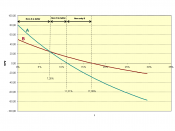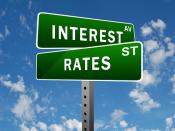Businesses need to understand how their money, investments, or loans are a benefit or detriment to them over time. To gain a better understanding, one should contemplate the time value of money (TVM). According to Benshoof (2005), "The time value of money quantifies the value of money over time. The time value of money depends upon the rate of return or interest rate that can be earned by investing the current money on hand" (p. 74). To recognize how annuities-a set of fixed payments over a specified length of time-affect the time value of money managers need to consider the factors of interest rates, opportunity cost, future and present values of the money, and compounding.
Opportunity Cost
Many times firms need to decide on how to best utilize its cash on hand. Should they invest it in the stock market or purchase more equipment with the hopes that it will increase productivity and profitability? A tough decision in some cases, but businesses should determine which is the wiser choice based on their financial situation.
The opportunity cost associated with these choices is whether or not the company could have earned more money by choosing to do something else with the funds. TVM helps managers in figuring out which of the opportunities presented to them is the best option. The preferred alternative is one that increases the company's monetary value today as opposed to a later point in time.
Understanding Interest Rates and Compounding
In most business cases, borrowing money is not necessarily a free enterprise. It costs companies money to obtain funds on credit to finance various aspects of their business. The fee that a borrower pays to a lender for use of its money is interest. The annual percentage rate (APR) makes assumptions based on simple interest,


